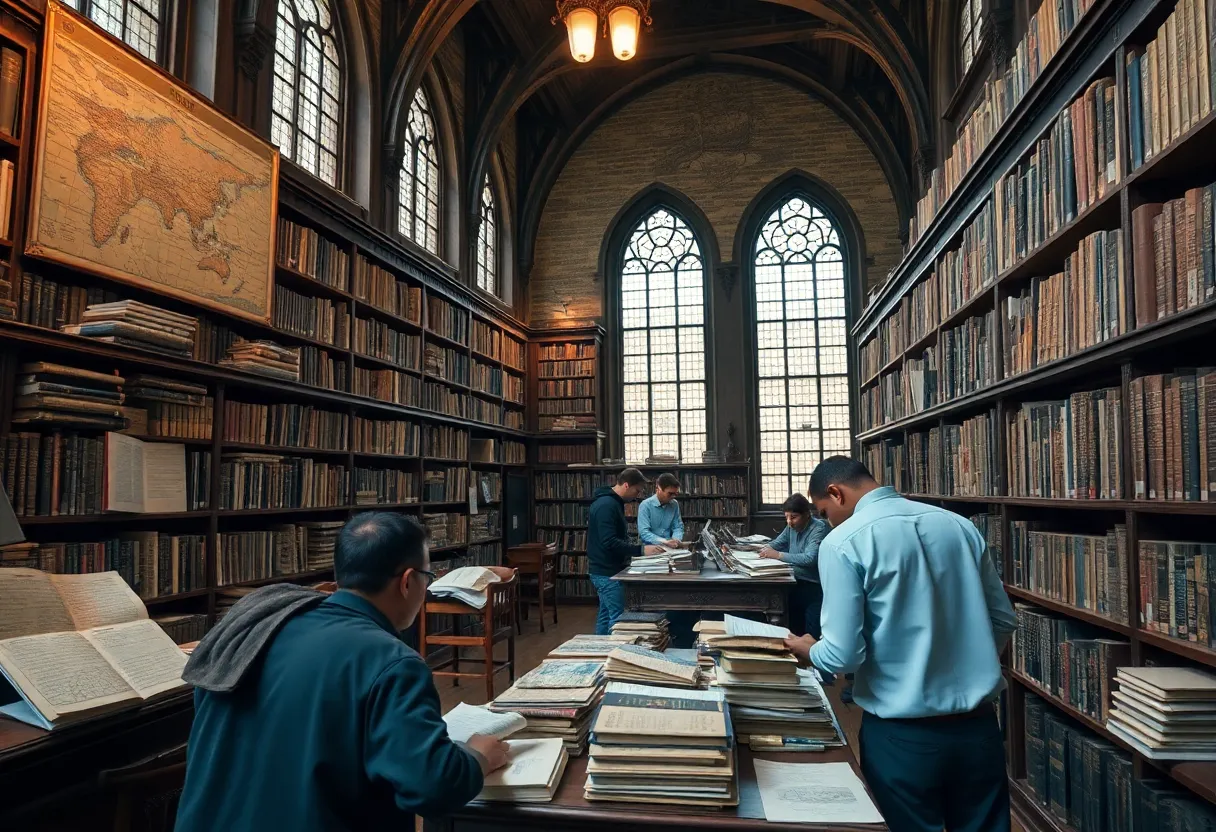Omaha, October 14, 2025
The University of Nebraska Omaha has announced an expansion of access to its historical archives, making rare documents from the city’s founding era available to the public. This initiative includes digital scans and in-person viewings free of charge, enhancing community engagement with Omaha’s rich heritage. Educational workshops at Criss Library focus on historical significance and foster public interest. The project is a part of ongoing efforts to preserve local history through accessible resources, ensuring Omaha’s narrative is shared with a wider audience.
Omaha Expands Access to Historical Archives
Omaha – The University of Nebraska Omaha has announced an expansion of access to its archives, making rare documents from the city’s founding era available to the public starting today. This initiative provides digital scans and in-person viewings free of charge during regular library hours, aiming to preserve and share Omaha’s rich heritage.
Supporting this effort, the university is offering educational workshops at Criss Library, which have already begun drawing crowds of local history enthusiasts. These workshops focus on the historical significance of the documents, helping visitors understand Omaha’s development over time. The expanded access is designed to be inclusive, allowing anyone to explore these materials without any cost, thereby increasing public engagement with the city’s past.
In terms of practical details, the digital scans can be accessed online through the library’s website, while in-person viewings require visitors to visit Criss Library during its operating hours. This setup ensures that both remote and on-site users can benefit from the resources. The initiative is part of a broader commitment to historical preservation, with the university emphasizing the importance of making these artifacts accessible to educate and inspire the community.
Background on this development highlights Omaha’s historical context. The city’s founding era documents include records that detail early settlement, growth, and key events that shaped the region. By digitizing and opening these archives, the University of Nebraska Omaha is addressing the need to protect fragile materials from deterioration while fostering greater public interest in local history. This move builds on previous efforts to catalog and maintain these collections, ensuring they remain a vital resource for researchers, students, and the general public.
The expansion comes at a time when interest in local history is growing, as more people seek to connect with their community’s roots. This initiative not only safeguards important artifacts but also promotes educational opportunities through workshops that delve into topics like early Omaha architecture, social developments, and cultural milestones. Attendees have reported gaining a deeper appreciation for the city’s evolution, with the free access removing barriers that might have previously limited participation.
Further, the university’s decision to make these resources available reflects a response to community demands for more open historical access. By integrating digital technology, the archives can reach a wider audience, including those who cannot visit in person. This approach combines tradition with innovation, ensuring that Omaha’s historical narrative is preserved for future generations.
As this program rolls out, it is expected to encourage more community events centered around history. The Criss Library has become a hub for these activities, with staff guiding visitors through the collections and facilitating discussions. This expansion underscores the role of educational institutions in promoting cultural awareness, making history an active part of everyday life in Omaha.
In summary, the University of Nebraska Omaha’s archive expansion is a significant step toward democratizing access to historical materials. It highlights the value of preserving Omaha’s heritage while providing tools for learning and engagement, all at no cost to the public.
Key Details on Access
- Starting today: Digital scans and in-person viewings are available.
- Free of charge: No fees for access during library hours.
- Educational workshops: Held at Criss Library to provide context on the documents.
- Aims: To preserve and share the city’s rich heritage.
To expand on this, the initiative draws from Omaha’s long-standing history of community-driven preservation efforts. These archives include maps, letters, and records that offer insights into the city’s foundational years, helping to illustrate how Omaha grew into a key Midwestern hub. This effort aligns with broader trends in historical preservation, where institutions are increasingly using technology to make resources more accessible.
Overall, this development not only enriches the community’s understanding of its past but also encourages ongoing participation in historical activities. By making these resources freely available, the university is fostering a sense of shared ownership and pride in Omaha’s story.
FAQ Section
Below are frequently asked questions based on the details of the archive expansion:
- When does the expanded access to the archives start?
- Starting today, digital scans and in-person viewings of rare documents from Omaha’s founding era are available free of charge during library hours.
- What resources are now available through this initiative?
- Digital scans and in-person viewings of rare documents from Omaha’s founding era are available free of charge during library hours.
- Where can people access these archives?
- Digital scans and in-person viewings are available at Criss Library for educational workshops, with the initiative aiming to preserve and share the city’s rich heritage.
- What is the purpose of this expansion?
- This initiative aims to preserve and share the city’s rich heritage, drawing crowds to Criss Library for educational workshops.
Key Features Chart
The following table outlines the key features of the archive expansion:
| Feature | Description |
|---|---|
| Digital Scans | Available free of charge starting today for remote access to rare documents from Omaha’s founding era. |
| In-Person Viewings | Offered during library hours at Criss Library, allowing direct interaction with the archives. |
| Educational Workshops | Drawing crowds to Criss Library, focused on preserving and sharing the city’s rich heritage. |
| Cost | Free of charge, ensuring accessibility for all interested individuals. |
Deeper Dive: News & Info About This Topic
HERE Resources
Omaha Newspapers to End Daily Print Editions Amid Digital Shift
Omaha World-Herald Cuts Print Editions to Five Days a Week


